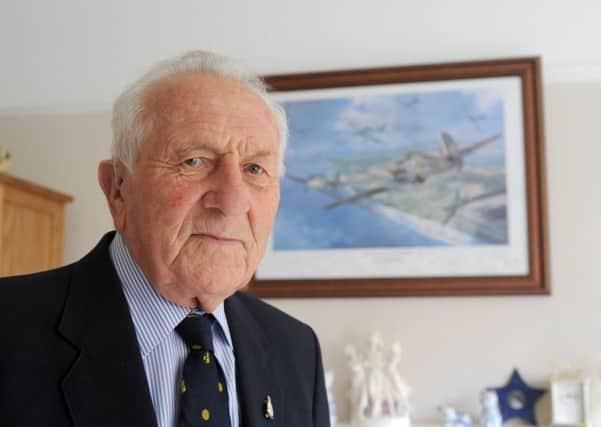Rugby Second World War fighter pilot dies


Tony Pickering moved to the town for work just before the war and was only 19 when he was strapped into the cockpit of a Hurricane and sent out to fight the German Luftwaffe.
He once had to evacuate from his own blazing aircraft by turning it upside down and falling through the roof, parachuting safely to the ground in Caterham, Surrey, where he was initially arrested as a German spy.
Advertisement
Hide AdAdvertisement
Hide AdHis widow Chris, speaking this week from their home in Hillmorton, said: “Tony lived to a good age and he enjoyed his life; his time in the RAF and his work as an engineer.”


Mr Pickering had two children, five grandchildren and five great-grandchildren. His funeral will be held at St John the Baptist Church at Hillmorton on Friday, April 8, at 2pm.
He had been taught to fly as a reservist in the late 1930s, while working as an apprentice engineer in Rugby.
He was called up the week before war broke out, and posted to Biggin Hill aerodrome in Kent in July, 1940.
Advertisement
Hide AdAdvertisement
Hide AdIn an interview five years ago, Mr Pickering said: “The C/O called us in and said ‘Pickering, how many hours have you done on a Hurricane?’


“I said ‘I’ve never even see one!’ He said ‘Well, there’s one outside. This afternoon you will do three circuits and bumps (circling and landing at the air strip) and then tomorrow morning you will join your squadron at a forward base in Hawkinge, near Dover’.”
The next day the young sergeant pilot found himself in a Hurricane, flying in close formation 10ft behind the tail of his flight lieutenant, with his gun button turned off.
He said: “I understood once I was more experienced why he didn’t want me firing my guns. He feared I might fire at the wrong time and hit him!”
Advertisement
Hide AdAdvertisement
Hide AdFortunately, the sortie went without incident and Mr Pickering was soon posted to 501 squadron at Gravesend before moving to Kenley Aerodrome, on the front line of the Battle of Britain, attacking German bombers as they conducted raids on London.
“They would come over, 150 to 200 planes at a time,” said Mr Pickering. “It was like a black cloud.
“The Spitfires would try to keep the German fighter escort off the Hurricanes while we attacked the bombers.”
The Battle of Britain, from July 1 to October 31, 1940, was the first major defeat of Hitler’s Germany and ended any hopes the Nazis had of an invasion of Britain.
Advertisement
Hide AdAdvertisement
Hide AdThe pilots who fought in it are known as ‘The Few’, from the famous Winston Churchill speech: “Never, in the field of human conflict, was so much owed by so many to so few.”
Mr Pickering went on to fly the Spitfire, serving in Egypt and from all over the UK, escorting bombers over occupied Europe during 75 missions. After leaving the RAF in 1946 Mr Pickering finished his apprenticeship and eventually enjoyed a career travelling around the world selling power stations working as a sales engineer.
n He grew up in Foxton, near Market Harborough, before coming to Rugby and his brother Joe still lives there. On a return to his old school in 2011, Robert Smyth Academy in Harborough, Mr Pickering told our sister paper: “I’ve had enough of wars. I’ve no time for them. It’s better to get round a table and sort out your differences.”